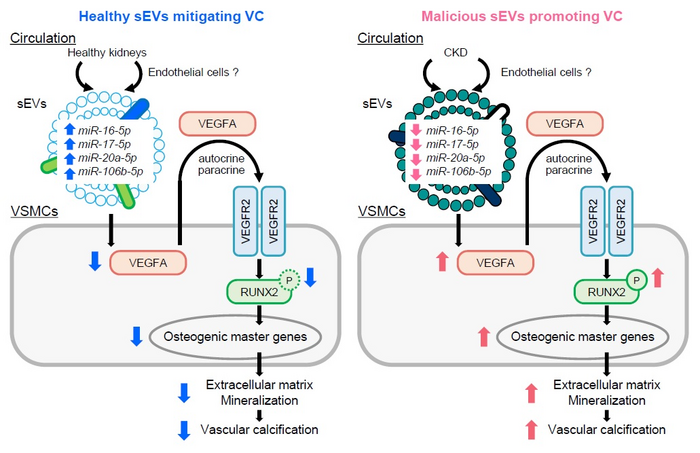Researchers from Tokyo Medical and Dental University (TMDU) have uncovered a link between cardiovascular disease and chronic kidney disease, revealing novel disease biomarkers and therapeutic targets

Credit: Department of Nephrology, TMDU
Researchers from Tokyo Medical and Dental University (TMDU) have uncovered a link between cardiovascular disease and chronic kidney disease, revealing novel disease biomarkers and therapeutic targets
Tokyo, Japan – Chronic kidney disease is linked to the formation of mineral deposits on blood vessel walls, known as “calcification”, causing cardiovascular disease. Small extracellular vesicles (sEVs)—small, enclosed structures outside cells—can transmit signaling molecules between cells, but their biological roles are not fully understood. Now, “malicious” sEVs originating from chronic kidney disease have been shown to play a role in blood vessel calcification through a signaling pathway called “VEGFA”.
Muscle cells (vascular smooth muscle cells) in the blood vessel walls can undergo a process called “phenotypic switching”, which alters them from a contractile state that maintains normal structure and function into a non-contractile state. This is often the first step toward cardiovascular disease and calcification of the blood vessel walls. Chronic kidney disease can promote this phenotypic switching, and now researchers from TMDU have shown that the two are linked through alterations to sEVs derived from chronic kidney disease.
sEVs are naturally secreted by all cells. They carry and spread a variety of signaling molecules between cells, including proteins, microRNA (miRNA), and DNA. The team sequenced the population of miRNAs in circulating sEVs and found that four miRNAs were decreased in sEVs from both a rodent model and from humans with chronic kidney disease. These miRNAs are protective against vascular calcification. “Computational analysis showed that this quartet of miRNAs targets VEGFA–VEGFR2 signaling, which is a key signaling pathway that drives vascular calcification,” explains joint first author Takaaki Koide. “The reduction in the miRNA levels was linked to an increased amount of VEGFA protein”.
“We then showed that therapeutic inhibition of the VEGFA pathway, both pharmacologically and genetically, reduced the vascular calcification in our rodent model of chronic kidney disease,” explains Shintaro Mandai, joint first author. Treatment of chronic kidney disease patients with these VEGFA inhibitors may potentially lessen the associated vascular calcification. Targeting the sEVs themselves may also have therapeutic potential.
“The quartet of miRNAs also showed diagnostic efficiency, as the expression level of each miRNA is useful for predicting calcification of the abdominal aorta,” explains senior author Shinichi Uchida. “These miRNAs are therefore strong candidates as both biomarkers of disease and therapeutic targets.”
This study reveals for the first time that vascular calcification is controlled by VEGFA signaling that is activated by sEVs derived from chronic kidney disease. It could prove key to the treatment of these diseases, which are highly significant worldwide.
###
The article, “Circulating Extracellular Vesicle-Propagated microRNA Signature as a Vascular Calcification Factor in Chronic Kidney Disease”, was published in Circulation Research at DOI: 10.1161/CIRCRESAHA.122.321939.
Journal
Circulation Research
DOI
10.1161/CIRCRESAHA.122.321939
Article Title
Circulating Extracellular Vesicle-Propagated microRNA Signature as a Vascular Calcification Factor in Chronic Kidney Disease




